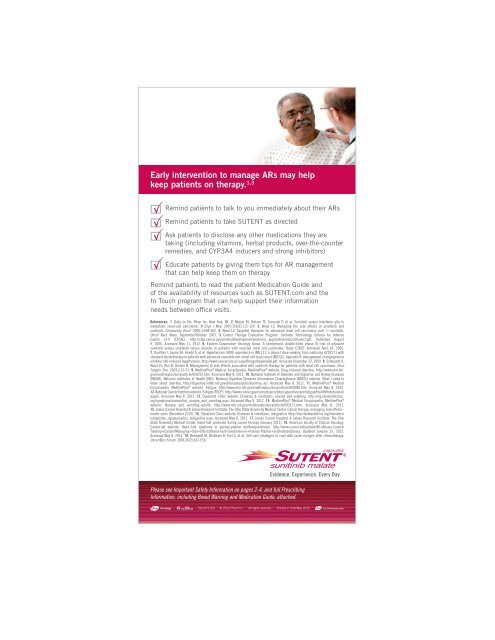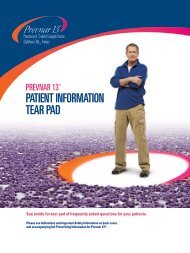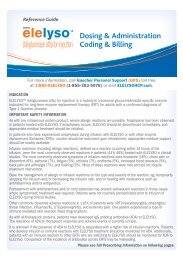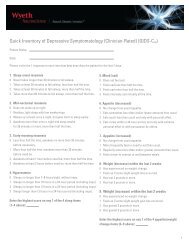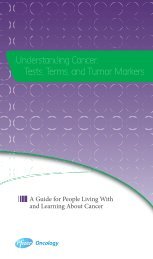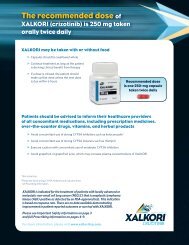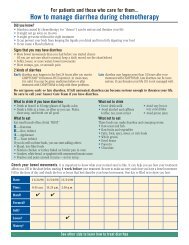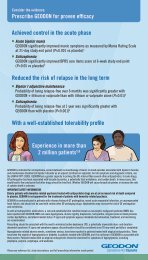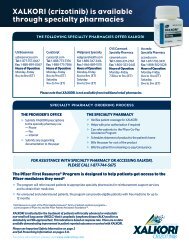Create successful ePaper yourself
Turn your PDF publications into a flip-book with our unique Google optimized e-Paper software.
early intervention to manage ars may help<br />
keep patients on therapy. 1,3<br />
Remind patients to talk to you immediately about their ARs<br />
Remind patients to take SUTENT as directed<br />
Ask patients to disclose any other medications they are<br />
taking (including vitamins, herbal products, over-the-counter<br />
remedies, and CYP3A4 inducers and strong inhibitors)<br />
Educate patients by giving them tips for AR management<br />
that can help keep them on therapy<br />
Remind patients to read the patient Medication Guide and<br />
of the availability of resources such as SUTENT.com and the<br />
In Touch program that can help support their information<br />
needs between office visits.<br />
References: 1. Data on file. Pfizer Inc, New York, NY. 2. Motzer RJ, Hutson TE, Tomczak P, et al. Sunitinib versus interferon alfa in<br />
metastatic renal-cell carcinoma. N Engl J Med. 2007;356(2):115-124. 3. Wood LS. Managing the side effects of sorafenib and<br />
sunitinib. Community Oncol. 2006;3:558-562. 4. Wood LS. Targeted therapies for advanced renal cell carcinoma: part I—sunitinib.<br />
Oncol Nurs News. September/October 2007. 5. Cancer Therapy Evaluation Program. Common Terminology Criteria for Adverse<br />
Events v3.0 (CTCAE). http://ctep.cancer.gov/protocolDevelopment/electronic_applications/docs/ctcaev3.pdf. Published August<br />
9, 2006. Accessed May 11, 2012. 6. Eastern Cooperative Oncology Group. A randomized, double-blind phase III trial of adjuvant<br />
sunitinib versus sorafenib versus placebo in patients with resected renal cell carcinoma: Study E2805. Activated April 24, 2006.<br />
7. Gauthier I, Laurie SA, Arnold A, et al. Hypertension (HTN): experience in IND.171, a phase I dose-seeking trial combining AZD2171 with<br />
standard chemotherapy in patients with advanced incurable non-small cell lung cancer (NSCLC). Appendix 8: management of angiogenesis<br />
inhibitor (AI)-induced hypertension. http://www.cancercare.on.ca/pdfdrugs/Appendix8.pdf. Accessed December 23, 2009. 8. Schwandt A,<br />
Wood LS, Rini B, Dreicer R. Management of side effects associated with sunitinib therapy for patients with renal cell carcinoma. Onco<br />
Targets Ther. 2009;2:51-61. 9. MedlinePlus ® Medical Encyclopedia. MedlinePlus ® website. Drug-induced diarrhea. http://www.nlm.nih.<br />
gov/medlineplus/ency/article/000293.htm. Accessed May 8, 2012. 10. National Institute of Diabetes and Digestive and Kidney Diseases<br />
(NIDDK), National Institutes of Health (NIH). National Digestive Diseases Information Clearinghouse (NDDIC) website. What I need to<br />
know about diarrhea. http://digestive.niddk.nih.gov/ddiseases/pubs/diarrhea_ez/. Accessed May 8, 2012. 11. MedlinePlus ® Medical<br />
Encyclopedia. MedlinePlus ® website. Fatigue. http://www.nlm.nih.gov/medlineplus/ency/article/003088.htm. Accessed May 8, 2012.<br />
12. National Cancer Institute website. Fatigue (PDQ ® ). http://www.cancer.gov/cancertopics/pdq/supportivecare/fatigue/HealthProfessional/<br />
page5. Accessed May 8, 2012. 13. Cleveland Clinic website. Diseases & conditions: nausea and vomiting. http://my.clevelandclinic.<br />
org/symptoms/nausea/hic_nausea_and_vomiting.aspx. Accessed May 8, 2012. 14. MedlinePlus ® Medical Encyclopedia. MedlinePlus ®<br />
website. Nausea and vomiting–adults. http://www.nlm.nih.gov/medlineplus/ency/article/003117.htm. Accessed May 8, 2012.<br />
15. James Cancer Hospital & Solove Research Institute. The Ohio State University Medical Center. Cancer therapy: managing side effects–<br />
mouth sores (December 2010). 16. Cleveland Clinic website. Diseases & conditions: indigestion. http://my.clevelandclinic.org/disorders/<br />
indigestion_dyspepsia/hic_indigestion.aspx. Accessed May 8, 2012. 17. James Cancer Hospital & Solove Research Institute. The Ohio<br />
State University Medical Center. Hand foot syndrome during cancer therapy (January 2011). 18. American Society of Clinical Oncology.<br />
Cancer.net website. Hand–foot syndrome or palmar-plantar erythrodysesthesia. http://www.cancer.net/patient/All+About+Cancer/<br />
Treating+Cancer/Managing+Side+Effects/Hand-Foot+Syndrome+or+Palmar-Plantar+Erythrodysesthesia. Updated January 23, 2012.<br />
Accessed May 8, 2012. 19. Rehwaldt M, Wickham R, Purl S, et al. Self-care strategies to cope with taste changes after chemotherapy.<br />
Oncol Nurs Forum. 2009;36(2):E47-E56.<br />
Please see Important Safety Information on pages 2-4, and full Prescribing<br />
Information, including Boxed Warning and Medication Guide, attached.<br />
Evidence. Experience. Every Day.<br />
SUU471124 © 2012 Pfizer Inc. All rights reserved. Printed in USA/May 2012


